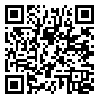Download citation:
BibTeX | RIS | EndNote | Medlars | ProCite | Reference Manager | RefWorks
Send citation to:



BibTeX | RIS | EndNote | Medlars | ProCite | Reference Manager | RefWorks
Send citation to:
Vasili A, keshtiarai N, yousefy A. Crystallization of professionalism for medical students: Education and consequences. Iranian Journal of Medical Education 2021; 21 :131-154
URL: http://ijme.mui.ac.ir/article-1-5136-en.html
URL: http://ijme.mui.ac.ir/article-1-5136-en.html
Assistan Professor, Department of Educational Sciences, Isfahan (Khorasgan) Branch, Islamic Azad University, Isfahan, Iran. , n_keshtiara@khuisf.ac.ir
Abstract: (2838 Views)
Introduction: Professionalism is now considered as a key component of health care providers. This systematic review endeavored to examine domestic and international documents regarding professionalism education in medical students and consequences.
Methods: This Narrative review employed the English and Persian keywords of medical professionalism, Medical professionalism, curriculum, professionalism curriculum, medical education, and combining these keywords in electronic databases as Scopus, Web of Sciences and Medline was done using Google scholar and Google. National electronic databases SID, Magiran and Iranmedex were included as well. The articles and sources reviewed were from the years 1999 to 2019. Finally, 38 articles and three books were reviewed. This way, extraction of materials was done.
Results: This Narrative review indicates that in the dimension of professionalism education, 11 components (curriculum, educational structure, individual factors, human factors, appropriate model, environmental factors, learners' experiences, use of appropriate learning theories, norms, motivational factors and appropriate evaluation) is more important. Professionalism training leads to the crystallization of consequences, most of which include 7 consequences; the crystallization of the traditional values of being a physician, professional commitment, socialization, professional competence, building trust in communication, forming values and forming the professional identity of learners. Studies underlined that the role of the hidden curriculum in teaching professionalism and shaping consequences.
Conclusion: The Medical education should be reviewed in such a way that the professionalism education of medical students is included in all levels of education in addition to paying more attention to the hidden curriculum, as well as developing a written formal curriculum for medical professionalism.
Methods: This Narrative review employed the English and Persian keywords of medical professionalism, Medical professionalism, curriculum, professionalism curriculum, medical education, and combining these keywords in electronic databases as Scopus, Web of Sciences and Medline was done using Google scholar and Google. National electronic databases SID, Magiran and Iranmedex were included as well. The articles and sources reviewed were from the years 1999 to 2019. Finally, 38 articles and three books were reviewed. This way, extraction of materials was done.
Results: This Narrative review indicates that in the dimension of professionalism education, 11 components (curriculum, educational structure, individual factors, human factors, appropriate model, environmental factors, learners' experiences, use of appropriate learning theories, norms, motivational factors and appropriate evaluation) is more important. Professionalism training leads to the crystallization of consequences, most of which include 7 consequences; the crystallization of the traditional values of being a physician, professional commitment, socialization, professional competence, building trust in communication, forming values and forming the professional identity of learners. Studies underlined that the role of the hidden curriculum in teaching professionalism and shaping consequences.
Conclusion: The Medical education should be reviewed in such a way that the professionalism education of medical students is included in all levels of education in addition to paying more attention to the hidden curriculum, as well as developing a written formal curriculum for medical professionalism.
Type of Study: Review article |
Subject:
Curriculum Development
Received: 2020/09/16 | Accepted: 2021/02/27 | Published: 2021/04/4 | ePublished: 2021/04/4
Received: 2020/09/16 | Accepted: 2021/02/27 | Published: 2021/04/4 | ePublished: 2021/04/4
Send email to the article author
| Rights and permissions | |
 |
This work is licensed under a Creative Commons Attribution-NonCommercial 4.0 International License. |





